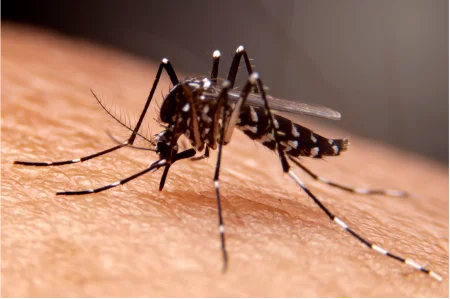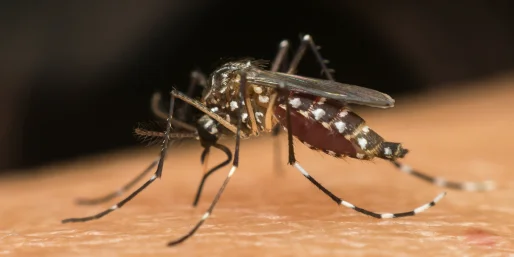Dengue is a viral infection caused by the dengue virus, primarily spread through the bites of infected Aedes mosquitoes, such as Aedes aegypti and Aedes albopictus. Common in tropical and subtropical regions, dengue can range from mild to severe, with some cases resulting in potentially fatal complications like dengue hemorrhagic fever or dengue shock syndrome. With four distinct serotypes of the virus, immunity to one doesn’t protect against others, increasing the risk of repeated infections. Mumbai’s best dengue fever hospitals offer comprehensive care, focusing on early diagnosis and management to prevent severe complications. Effective treatment involves hydration, pain management, and careful monitoring to reduce the risks associated with the disease. Timely medical intervention is key to ensuring a quick recovery.
What is Dengue?
Dengue is a viral infection by the dengue virus that is usually transmitted through mosquito bites from the Aedes species, including the Aedes aegypti and Aedes albopictus. The disease is found in both tropical and subtropical parts of the world where such mosquitoes breed. There are various forms of illness that this disease takes, ranging from very mild to severe and potentially fatal for the afflicted person. There are four distinct dengue serotypes, and immunity from infection with one of the serotypes does not cross over to protect against any of the other serotypes, thus individuals can become infected more than once during their lifetime. Millions of cases are reported worldwide every year, so dengue is a significant global health issue.
How is Dengue Acquired?

Dengue transmission primarily occurs from an infected mosquito bite. Infected mosquito: The mosquito gets infected by feeding on a patient already infected with the dengue virus. It then, in turn, proceeds to infect others by feeding on them. Risk factors of infection: They vary as they are determined by the environment. This contains climatic, urban, and human behavior factors. Ponds that do not change water conditions, like broken containers, puddles, or almost kept storage of water, are perfect breeding spots for these mosquitoes. Dengue, therefore, is more prevalent during the rainy season because the mosquito population increases with the increase in breeding sites.
Prevalence of Dengue
- High fever :- Sudden onset of fever is usually the most common initial presentation.
- Severe headache :- Pain in the forehead is one of the most frequent presentations.
- Pain behind the eyes :- Many patients complain of eye discomfort.
- Joint and muscle pain :- Severe muscle and joint pain are characteristic, often referred to as “breakbone fever.”
- Nausea and vomiting :- Gastrointestinal symptoms can occur in association with the fever.
- Rash :- A rash may develop a few days after the fever onset and typically lasts for several days.
- Extreme abdominal pain
- Recurring vomiting
- Bleeding from the nose or gums
- Presence of blood in vomit or stool
- Fatigue and restlessness
- One must seek immediate medical care if such signs begin to appear.
- Rest :- This ensures that the body reenergizes itself fully.
- Pain relief :- The recommended pain and fever relievers include acetaminophen (paracetamol). Aspirin and non-steroidal anti-inflammatory drugs (NSAIDs) such as ibuprofen are contraindicated and thus must not be used because they enhance the risk of bleeding.
- Hydration :- Fluid management is critical, and patients should be motivated to drink sufficient fluids, such as water and electrolyte solutions.
Dengue is one of the most common viral diseases in the world, with almost 400 million infections taking place each year. The World Health Organization puts forth estimates that one in four individuals infected with the virus will experience symptoms, hence causing a high degree of reported cases every year. The disease is very widespread in tropical and subtropical areas; it ranges from Southeast Asia, the Pacific Islands, the Americas, and parts of Africa. It can happen within a short period and is usually due to urbanization and poor mosquito control, along with climatic modifications that favor mosquito breeding. According to the CDC, dengue outbreaks have also been noted in certain areas of the United States where Aedes mosquitoes are present.
Symptoms
Symptoms of dengue develop within 4 to 10 days after an infected mosquito bites a person. The disease may either be mild or severe. Among them are the following:
In most instances, people feel better within one week after being infected with mild dengue, but severe dengue may develop in some cases. It may cause critical complications such as severe bleeding, organ impairment, and shock in the case of severe dengue. Some symptoms of warning signs for severe dengue are given below:
Treatment
Nowadays, no specific antiviral treatment exists for dengue. In mild dengue, symptomatic relief forms part of the management and this has been included in the list below:
The patient needs to seek medical care urgently. Patients usually need to be hospitalized for close monitoring and supportive care that may include intravenous fluids, blood transfusions, and treatment for complications.




